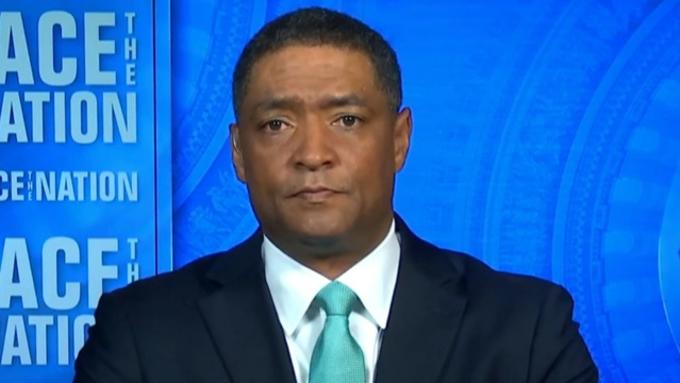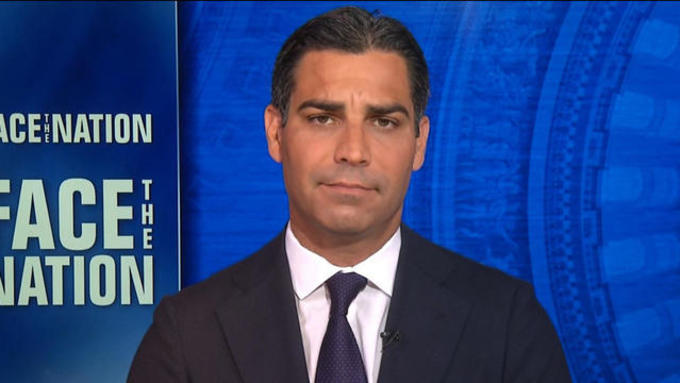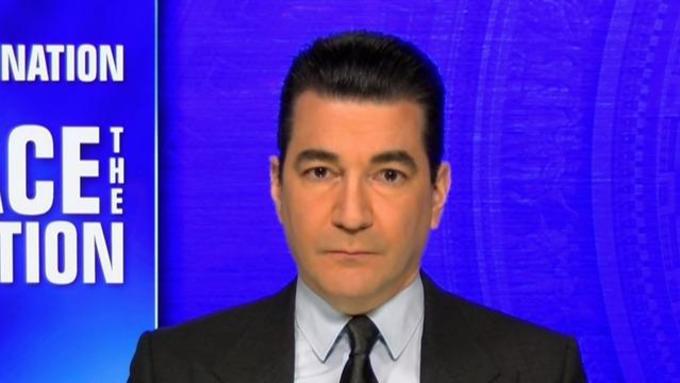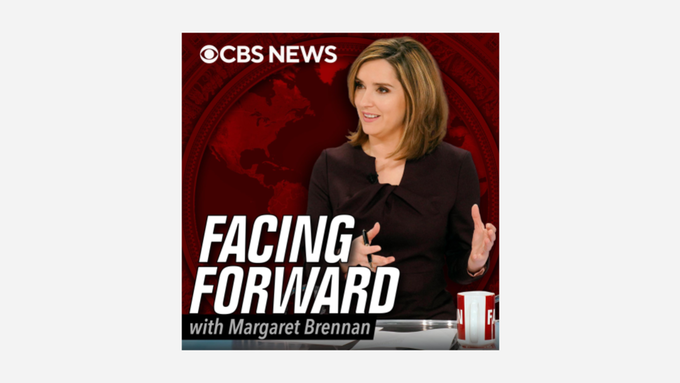| "You have to figure out how to get that message out when you can't get it out from the "We have the potential to turn a corner...We can't take our foot off the brake too quickly." -Former FDA Commissioner Dr. Scott Gottlieb on the need to continue COVID-19 mitigation
Welcome to "Face the Nation"'s Five at Five newsletter. Scroll down for your five takeaways from today's broadcast of "Face the Nation" with Margaret Brennan on CBS. Did someone forward you this? Sign-up at cbsnews.com/email. 1. Can we compromise? Richmond hints Biden willing to meet GOP over COVID relief  White House senior adviser Cedric Richmond said Sunday that President Biden is willing to sit down with a group of Republican senators who are requesting a meeting with the president to discuss a bipartisan coronavirus emergency relief bill. What we asked: 10 Republican senators sent a letter to the president and they say they just want a meeting. They have a proposal that they say mirrors many of the same things the president wants...is the president open to these ideas? And will he meet with them? What Richmond said: "The president said in his inauguration speech that he wanted to work with both sides in order to help the American people. And what we know about President Biden is it's never about him. It's always about the people. So, yes, he is very willing to meet with anyone to advance the agenda. But look, this is about seriousness of purpose. This is about meeting the moment. And this crisis is enormous, and our response to it meets that challenge. And so when you start talking about $1,400 to individuals, another $160 million so we can safely open schools, a couple of hundred million dollars to make sure that we help small businesses that are struggling, that's what the American people want to see. Seventy percent of the American people support President Biden's plan and another 71% of the American people want to see Republicans work with the president to meet the enormous challenges that we have." Why it matters: The plan, according to GOP senators, includes $160 billion for vaccine development and distribution, testing and contact tracing, and production of personal protective equipment. It also includes $4 billion for behavioral health and substance abuse services, as well as targeted economic aid to jobless Americans and another round of direct payments to individuals making up to $50,000 annually. President Joe Biden has put forth his own sweeping $1.9 trillion relief package, which is the White House's top legislative priority. But with the Senate evenly split between parties, 10 Republicans would need to join Democrats in supporting the measure for it to pass through the regular legislative process. GOP senators are balking at the cost of Mr. Biden's plan, as well as the inclusion of provisions such as a federal minimum wage hike to $15 an hour. Meanwhile, Democratic leaders in Congress are taking the first steps this week to pursue a maneuver called budget reconciliation, which would allow Mr. Biden's plan to pass without Republican support. 2. GOP showdown: Suarez singles out DeSantis over COVID mitigation  Republican Mayor Francis Suarez of Miami says he's tried multiple times to reach Florida Governor, fellow Republican Ron DeSantis, with requests related to being able to locally enforce COVID-19 mitigation efforts in his city as mayor. The outreach, however, has gone unanswered. What we asked: So are you telling him, as mayor, I need power over my own city? What Suarez said: "Sure, yeah. I've tried to reach him on multiple occasions to tell him to give us the opportunity, not just here at the city, but in the county, to be able to institute things that we think are common sense, that we think are backed up by science and we can demonstrate are backed up by science. I have a chart that shows demonstrably that masks in public work. Thankfully, a lot of our residents are doing it regardless. I think they're obviously concerned about their own health. And certainly we've been hammering home the point in PSAs, you know, throughout, you know, the last few months. And I think that's one of the main reasons why our hospitalizations remain low. So I'm very thankful that our residents are listening, despite the fact that it's something that we can't mandate." Why it matters: While the sparring between Republican lawmakers is noteworthy, what's troubling is that Miami ranks as a growing hotspot for the highly contagious strain of coronavirus - B.1.1.7 - which originated in the United Kingdom. The mutant strain is now circulating in South Florida where restrictions are being eased in high-traffic areas like gyms, bars, and restaurants -- only complicating local leaders' efforts to mitigate the spread. 3. Gottlieb says vaccination "should be a backstop" to mutant variants  Dr. Scott Gottlieb, who once helmed the Food and Drug Administration (FDA), said to Margaret on Sunday that COVID-19 vaccines "should be a backstop" against a new coronavirus variant detected in the United Kingdom that has now been identified in the United States. What we asked: Dr. Fauci was on this program last Sunday and said that U.K. strain does have a certain degree of increase in virulence, meaning it can cause more damage, including death. Is it more deadly? What Gottlieb said: "The good news with B.1.1.7, if there is good news, is that as we vaccinate more of the population, it should be a backstop against the continued spread of that variant," Gottlieb said of the U.K. strain. Why it matters: New coronavirus variants have been identified in the U.K., South Africa and Brazil and are now circulating globally, according to the Centers for Disease Control and Prevention . The U.K. variant, B.1.1.7., has been reported in 30 states, while the South African variant, B.1.351, and Brazilian variant, P.1, have been reported in South Carolina and Minnesota, respectively. Gottlieb said there is evidence to suggest the U.K. strain causes more severe illness and is roughly 50% more transmissible, but he noted that data from COVID-19 vaccine trials from Johnson & Johnson and Novavax, which are both developing coronavirus vaccine, shows immunization and prior infection appear to be protective against the variant. 4. Are the kids alright? Local leaders weigh in  With updated CDC guidance on community spread in schools, "Face the Nation" pressed local leaders on how, if at all, teachers would be given the priority with regards to vaccination and just when kids could return to school. Connecticut Governor Ned Lamont and Chicago Public Schools CEO Janice Jackson offered their perspectives. What we asked: Will you prioritize teachers in your state? What Lamont said: "We've got manufacturing folks and defense industries. I've got day care workers. So, I've got to be careful about how you prioritize. But I got to tell you, teachers are right near the top of that list because of what we're doing to keep our schools open and our kids in the game." What Jackson said: "In Chicago and in Illinois, we are prioritizing teachers. They are included in 1b, which is currently underway. I think the issue is definitely around vaccine supply. The more vaccines we're able to get, we'll be able to vaccinate people sooner. We have started vaccinating individuals in our school system, which is important to note. We started with our health care workers and those individuals who work closely with students where they may be at more risk for exposure. But again, in order to accelerate vaccination of our teachers, we quite frankly need more supply." Why it matters: As more schools eye a return to in-person learning, such as Chicago intends on doing this week, pending resolution of an ongoing union dispute, it's important that those teaching children feel safe as children feel safe showing up for an education. But without clear guidance on vaccine distribution, it's yet to be seen if teachers will feel they've been given enough protection from the ongoing pandemic to return to a semblance of normalcy in the classroom. 5. Take a listen: Eli Lilly CEO on virus mutations and treatments  Missed our "Facing Forward" episode this week? Listen to our conversation with Eli Lilly CEO David Ricks here.
| 
No comments:
Post a Comment